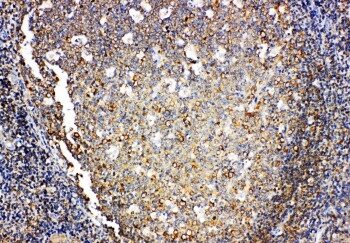Interleukin-4 (IL-4), also knowns as a B-cell stimulatory factor1 (BSF1), is an immunomodulatory cytokine, which can inhibit the growth of tumor cells. The human cDNA contains a single open reading frame encoding a protein of 153 amino acids, including a putative signal peptide. IL-4 may act as an autocrine growth factor in pancreatic cancer cells and also give rise to the possibility that cancer-derived IL-4 may suppress cancer-directed immunosurveillance in vivo in addition to its growth-promoting effects, thereby facilitating pancreatic tumor growth and metastasis. The mouse and human genes and their protein products show structural and functional similarities. The human IL-4 gene, which occurs as a single copy in the haploid genome, is mapped on chromosome 5. The standard product used in this kit is recombinant human IL-4, consisting of 130 amino acids with the molecular mass of 14 KDa. Participates in at least several B-cell activation processes as well as of other cell types. It is a costimulator of DNA-synthesis. It induces the expression of class II MHC molecules on resting B-cells. It enhances both secretion and cell surface expression of IgE and IgG1. It also regulates the expression of the low affinity Fc receptor for IgE (CD23) on both lymphocytes and monocytes.
Clone
Polyclonal
Isotype
IgG
Host species
Rabbit
Species Reactivity
Human, mouse, rat
Cellular Localization
secreted
Positive Control
tonsil
Applications
IHC, WB
Intended Use
Research Use Only

